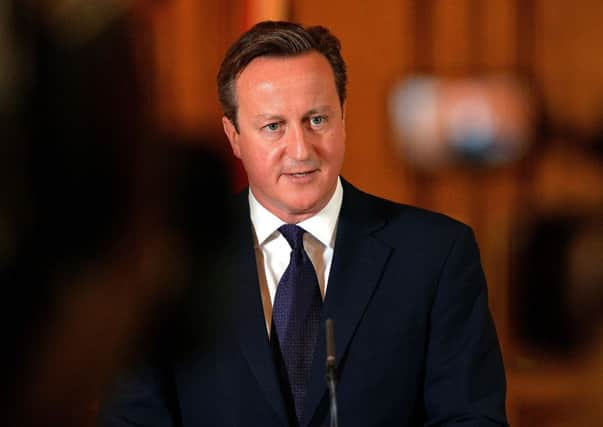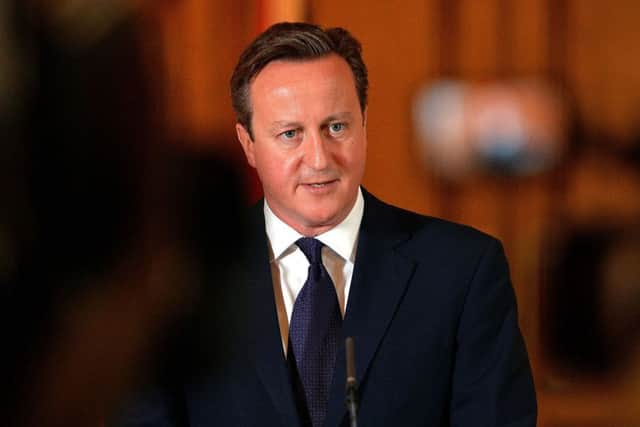David Cameron: We must act on IS terror – but act differently


Deir al-Zor is a province in Eastern Syria. Home to the al-Sheitaat tribe, it was captured by ISIL last month. Seven hundred tribesmen were executed, many were beheaded.
The vast majority were civilians - Muslims - who refused to take an oath of allegiance to ISIL’s sick extremist world view – and who paid for this with their lives.
They are not alone.


Advertisement
Hide AdAdvertisement
Hide AdAcross Syria and Northern Iraq thousands have suffered the same fate. Muslims – both Sunni and Shia. Christians, Yazidis, people of every faith and none. ISIL is not a problem restricted to just one region.
It has murderous plans to expand its borders well beyond Iraq and Syria, and to carry out terrorist atrocities right across the world.
It is recruiting new fighters from all over the world. Five hundred have gone there from my country Britain, and one of them almost certainly brutally murdered two American journalists and a British aid worker.
This is a problem that affects us all. And we must tackle it together.
Advertisement
Hide AdAdvertisement
Hide AdNow there is not one person who will view this challenge without reference to the past. Now of course it is absolutely right that we should learn the lessons of the past, especially of what happened in Iraq a decade ago.
But we have to learn the right lessons. Yes to careful preparation; no to rushing to join a conflict without a clear plan. But we must not be so frozen with fear that we don’t do anything at all.
Isolation and withdrawing from a problem like ISIL will only make matters worse. We must not allow past mistakes to become an excuse for indifference or inaction.
The right lesson is that we should act – but act differently. We should be:
Advertisement
Hide AdAdvertisement
Hide Ad•comprehensive – defeating the ideology of extremism that is the root cause of this terrorism - so that we win the battle of ideas, not just the battle of military might.
•intelligent – supporting representative and accountable governments and working with them at their requests, not going in over their heads.
•inclusive – working with partners in the region who are prepared to be part of the solution, potentially including Iran.
•uncompromising – using all the means at our disposal – including military force – to hunt down these extremists.
Advertisement
Hide AdAdvertisement
Hide AdThe root cause of this terrorist threat is a poisonous ideology of Islamist extremism. This is nothing to do with Islam, which is a peaceful religion which inspires countless acts of generosity every day. Islamist extremism on the other hand believes in using the most brutal forms of terrorism to force people to accept a warped world view and to live in a quasi-mediaeval state.
To defeat ISIL – and organisations like it - we must defeat this ideology in all its forms.
As evidence emerges about the backgrounds of those convicted of terrorist offences, it is clear that many of them were initially influenced by preachers who claim not to encourage violence, but whose world view can be used as a justification for it. We know this world view.
The peddling of lies: that 9/11 was a Jewish plot or that the 7/7 London attacks were staged. The idea that Muslims are persecuted all over the world as a deliberate act of Western policy. The concept of an inevitable clash of civilisations.
Advertisement
Hide AdAdvertisement
Hide AdWe must be clear: to defeat the ideology of extremism we need to deal with all forms of extremism – not just violent extremism.
For governments, there are some obvious ways we can do this. We must ban preachers of hate from coming to our countries. We must proscribe organisations that incite terrorism against people at home and abroad. We must work together to take down illegal online material like the recent videos of ISIL murdering hostages. And we must stop the so called non-violent extremists from inciting hatred and intolerance in our schools, our universities and yes, even our prisons.
Of course there are some who will argue that this is not compatible with free speech and intellectual inquiry.
But I say: would we sit back and allow right-wing extremists, Nazis or Klu Klux Klansmen to recruit on our university campuses? No.
Advertisement
Hide AdAdvertisement
Hide AdSo we shouldn’t stand by and just allow any form of non-violent extremism. We need to argue that prophecies of a global war of religion pitting Muslims against the rest of the world. These things are nonsense. We need Muslims and their governments around the world to reclaim their religion from these sick terrorists as so many are doing and quite rightly doing today. We all need to help them with programmes that channel young people away from these poisonous ideologues. And we need the strongest possible international focus on tackling this ideology.
Communism wasn’t defeated simply by pointing out its flaws – but by showing that the alternative of economic freedoms, democracy and the rule of law, these things could build a better society and a better world. Young people need to see the power of a different, better, more open, more democratic path. The twentieth century taught us the vital role of representative and accountable governments in offering their people opportunity, hope and dignity.
Of course we should not be naive: not every country can move at the same speed or even reach the same destination. And we should respect different cultures and traditions and histories. But, let’s be clear: the failure to meet people’s aspirations can create a breeding ground where extremist and even terrorist insurgency can take root.
What about the role of our military?
I don’t believe this threat of Islamist extremism will best be solved by Western ground troops directly trying to pacify or reconstruct Middle Eastern or African countries, but pursing an intelligent and comprehensive approach should include a place for our military.
Advertisement
Hide AdAdvertisement
Hide AdOur military can support the enormous humanitarian efforts that are necessary - as our Royal Air Force did helping the millions of people who have fled from ISIL. And we should – together – do more to build the capability of the legitimate authorities fighting the extremists.
We now have a substantial international coalition in place, including Arab nations, committed to confronting and defeating ISIL. We have a comprehensive strategy to do that – with the political, diplomatic, humanitarian and military components that it needs to succeed over time.
The UN Security Council has now received a clear request from the Iraqi government to support it in its military action against ISIL. So we have a clear basis in international law for action. And we have a need to act in our own national interest to protect our people and our society.
So it is right that Britain should now move to a new phase of action. I am therefore recalling the British Parliament to secure approval for the United Kingdom to take part in international air strikes against ISIL in Iraq.
Advertisement
Hide AdAdvertisement
Hide AdMy message today is simple. We are facing an evil against which the whole of the world should unite. And, as ever in the cause of freedom, democracy and justice, Britain will play its part.
• This is an edited version of David Cameron’s speech to the United Nations.